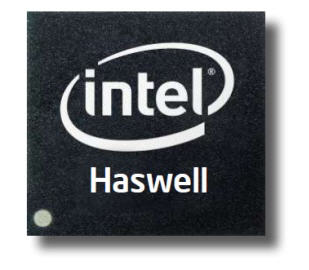Report: Intel Having USB 3.0 Problems with Haswell
Manufacturers supposedly must acknowledge certain issues with the Haswell platform before Intel ships them processors.
There's a report from Hardware.Info that claims Intel is having issues with USB 3.0 implementation in upcoming products based on fourth-generation Intel Core "Haswell" processors. This report stems from a "reliable source" who got his hands on an internal document sent to one of Intel's partners detailing the Haswell-based issue.
According to the supposed document, when a Haswell-based system wakes from an S3 sleep mode, users will experience issues if a device is plugged into one of the USB 3.0 ports. These "issues" include blank pages displayed in Acrobat Reader PDFs, video that stops rather than resumes, and more. A quick fix is to restart the troubled application without having to reboot the entire system.
That said, the USB 3.0 problems are only described as a "nuisance" to consumers, and won't result in major data loss or the start of Armageddon. Intel even supposedly states that it won't have any impact on the release of Haswell-based CPUs, and will likely be resolved in future processor stepping. The letter also requests that manufacturers acknowledge the issues before Intel will supply the Haswell processors.
Naturally Intel won't comment on rumors about future products. "I can tell you that Intel remains on track for the first 4th generation Intel Core processors to come to market starting in mid-2013," a company spokesperson told Hardware.Info.
The Haswell processor family is part of Intel's "tick tock" design process where it launches a new processor design in one year, and then shrinks it to a smaller process size in the following year. Haswell offers design tweaks made to the Ivy Bridge architecture which is essentially a process-shrunk revision of Sandy Bridge. New features introduced in Haswell include HNI instruction set architecture extensions, a high-performance L4 cache layer, models with a 10W TDP and more.
The Lynx Point chipset designed to accompany the Haswell processors comes packed with integrated USB 3.0 support for six individual ports, six on-board SATA 3 (6 Gb/s) ports and more. Unnamed industry sources claimed last year that both a weakening desktop market demand and Intel's Haswell family will cause several second-tier motherboard manufacturers to exit the market in late 2013 due to the integrated functions. That's because features like USB 3.0 help motherboard makers differentiate themselves from rivals.
Contact Us for News Tips, Corrections and Feedback
Get Tom's Hardware's best news and in-depth reviews, straight to your inbox.

Kevin Parrish has over a decade of experience as a writer, editor, and product tester. His work focused on computer hardware, networking equipment, smartphones, tablets, gaming consoles, and other internet-connected devices. His work has appeared in Tom's Hardware, Tom's Guide, Maximum PC, Digital Trends, Android Authority, How-To Geek, Lifewire, and others.
-
I learned my lesson about adopting early with the P67 chipset fun. Won't make that mistake again.Reply
-
InTELigentleMAN Sounds like mach ado about nothing. I'll restart acrobat out of a full sleep state and not worry about it... if I have a USB 3 device attached. Maybe this is the time to jump to Thunderbolt. Who knows!Reply -
lp231 Which USB 3 are we talking about? Is it Intel ones that's affected, or all of them like Renesas?Reply
If it's just Intel's why can't Intel just disable them and let mobo makers use 3rd party USB 3 chipsets instead.
-
TheBigTroll im sure if there is a problem, intel should be rather quick to fix it. just dont pull off one of those p67 chipset fiascosReply -
bison88 Damn. Intel had this same issue with the SATA controller on Sandy Bridge. Really hope they get this resolved or MOBO manufacturers find a fix. Not many will be happy putting off a build they've been waiting on for a year just for the next stepping.Reply -
InvalidError Sounds more like a driver problem than hardware to me: as long as the link-layer hardware does not get stuck in a failure mode when coming back from standby, the driver can be rewritten to issue a reset to the controller (get it unstuck) upon resume and hide it from applications/OS.Reply -
Nintendo Maniac 64 I guess this is one benefit of AMD using an older chipset - it's proven technology.Reply -
PreferLinux Fake, if you ask me. That comment by a supposed Intel rep is totally unlike any I've ever heard of before. Nor can I comprehend how it could only affect certain applications in that sort of way.Reply
